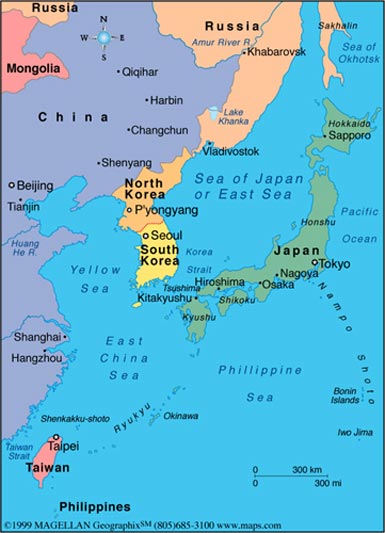
Same caution here as the last time I posted about Korea news: I have no expertise in these matters whatsoever. But, perhaps because Korea has been a policy sideshow for official Washington, a lot of what does get written about the Koreas seems somewhat less caught in a intellectual straightjacket than what we hear about such chewed over, if ill-digested, regions as the Middle East. Hence the title of this post.
I found this an interesting conundrum:
One of Podvig's Bulletin colleagues made an even more challenging suggestion:Imagine, in a thought experiment, that no country other than North Korea has nuclear weapons today. How would this change the practical policy choices and actions available to those involved? I would suggest the answer is surprisingly little, if at all. To begin with, existing nuclear weapon states' arsenals (and the U.S. arsenal in particular) have already failed in what many believe is one of their primary missions--dissuading countries such as North Korea from building a nuclear weapon.
Pavel Podvig,
Bulletin of the Atomic Scientists
I think of Hymans as applying an "origins of World War I" hypothesis to the Korean situation. In 1914, complex modern European societies set up a series of assumptions and trip wires that put them on a path to a war that few sought, but none could interrupt once they entered on what they had defined as their national critical paths. Hymans sees something like that developing in East Asia. The irrational strains in each of the societies involved could come into play. Scary prospect; worth pondering.The ... assumption, that North Korea essentially has the bomb today, is also problematic. That assumption derives from the widespread belief that given the right materials even a team of college physics students could build one, so a state should have no trouble at all. But this ignores the infinite capacity of neo-patrimonial or "sultanistic" regimes such as the one in Pyongyang to turn a sure thing into a long shot.
Jacques E. C. Hymans,
Bulletin of the Atomic Scientists
Meanwhile, at least some who know point out there is no prospect of North Korea's neighbor, China, taking a hard stance against nuclear weapons development.
This one I picked up via James Fallows....there's a silly assumption in Washington that our interests (no nukes in North Korea) are the same as China's. But they're not. China's first interest in North Korea is making sure the Kim regime doesn't collapse. China's second interest? Making sure the Kim regime doesn't collapse. From Beijing's perspective, nukes in North Korea rank somewhere around 10th.
...We can't outsource the solution to North Korea's nukes to China because China views its interests a lot differently than we do.John Pomfret,
Post Global,
a Washington Post/Newsweek blog
The articles I've excerpted above made my picture of what is happening in an unfamiliar part of the world more nuanced. Another contribution to the Bulletin was discouraging:
I have an unhappy feeling that more of us need to start grappling with understanding this situation.Many in Washington, Tokyo, and Seoul say Kim Jong Il will never give up his weapons or his nuclear and missile programs. The speculation encourages him to think he won't have to. The fact is, with the possible exception of Kim Jong Il himself, nobody truly knows. But the United States needs to find out.
The only way to do so is to probe through sustained diplomatic give-and-take.Leon V. Sigal
Bulletin of the Atomic Scientists
If I were to rate this post I would give it an A+. We need to get real here.
ReplyDelete